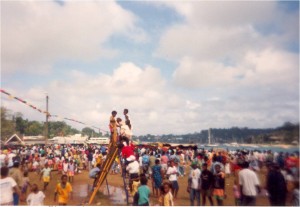Independence Struggle
no images were found
In the half century of Condominium rule, Christianity vanquished much of traditional Melanesian culture. Not only were tribal warfare, cannibalism and infanticide outlawed (though not entirely eliminated) but some of the more puritan Protestant sects banned drumming, singing, dancing and the consumption of kava, a liquid narcotic associated with Melanesian ritual.
| Drinking Kava, a Liquid Narcotic used in Ceremony |
Though some villagers in mountain hilltops still donned penis wrappers and grass skirts, most islanders came to dress in Mother Hubbards and shirts and trousers. But if conversion could change external behavior, it could not guarantee political complacency.
Beginning in the 1960s two major types of resistance to the colonial rule of the Condominium emerged. The first was led by this man, Jimmy Stephens, the self-taught grandson of a Scot sailor and a Tongan princess. Jimmy Stephens, whose formative experience included tractor driving for the American forces in the New Hebrides, came to lead a movement to reclaim the land taken by the Europeans. He did so in the name of what he called kastom.
Kastom referred to traditional Melanesian values and customs which Christianity and colonization had dangerously encroached upon. Chief among these traditional values was the sanctity of the land. Though his movement had support on various islands, Jimmy Stephens’ main base of support was on the island of Santo. His followers were mainly rural traditionalists who responded to his call for cultural and economic autonomy.
| Jimmy Stephens on Views on the Land “As far as Nagriamel is concerned, land is not for sale. You lease the land for a certain time, but it’s not for sale.” |
|
| School Singing in Santo, “I’m Satisfied” |
The second type of resistance movement also appealed to kastom but within a broader, more politically cosmopolitan framework. This was the nationalist movement headed by Father Walter Lini. Father Lini was an English-speaking Anglican priest from the island of Pentecost whose divinity training abroad exposed him to anti-colonial thinking throughout the Pacific. He believed in political independence for the New Hebrides along the same lines that colonies throughout the world were beginning to obtain.
His religious background led him to a version of liberation theology which linked spiritual freedom to political independence for the oppressed. At the same time, his was a culturally progressive Protestantism which celebrated Melanesian kastom as a manifestation of spirituality compatible with the basic doctrines of Christianity.
| Walter Lini on Religion and Politics |
Father Lini’s organization spoke the modern language of nationalism and had wider appeal than Jimmy Stephens’ Santo-centered, traditionalist-oriented movement. The British, who were reconciled to the inevitability of independence for their far flung colonies, were tacitly sympathetic towards Lini and his Vanuaaku Party. He was, after all, an Anglican and an anglophone–an English-speaker.
The French, whose post-War foreign policy did not embrace decolonization, were determined to oppose Lini, his British-supporters and all advocates of independence. So the French turned to Jimmy Stephens as a counterweight to Lini’s nationalist party. Although Stephens’ original targets included French landowners on Santo, he accepted their support. After all, he too was suspicious of the party of the English-speaking pastor and could use all the outside help he could muster.
Stephens even embraced American real estate speculators and libertarian entrepreneurs whose promises for a rich Vemarana, as they all called Stephen’s imaginary kingdom, were dazzling.
The French had other constituencies to counter the nationalist threat of Walter Lini and his anglophile Vanuaaku Party. French planters and their mixed blood relations–the metis–were also wary of the, as they saw it, Anglophone rabble rousers. The settlers and metis in turn enlisted New Hebridian francophones– the Melanesians who had been educated either in Catholic mission or in French government schools.
For Father Lini’s hostility to colonialism was not only more vociferous when directed at the French than the British, but seemed to include the suppression of French education in post- independence Vanuatu. The Francophones–that is, those who either speak French or identify with the French-speaking camp–united under the banner of the Union of Moderate Parties, or UMP. A prominent UMP leader was Maxime Carlot, himself a metis who had worked for the French administration.
Nationalist ferment and anglophone-francophone friction intensified throughout the 1970s. Father Lini’s Vanuaaku Party refused to
recognize the Condominium and instead set up its own government throughout the archipelago. Elections were held and boycotted. Clashes between anglophones and francophones became frequent, even after the creation of a government of national unity.
Some francophones vowed not to acquiesce to an independent government headed by anglophones of the Vanuaaku Party. Jimmy Stephens declared secession and was joined by a number of francophones. Whether the French resident commissioner, Jean-Jacques Robert, encouraged the rebellion remains a point of contention.
Reluctantly, France had agreed with its British partners to disband the Condominium and to grant independence. The Republic of Vanuatu was declared on July 30, 1980. Troops from Papua New Guinea, with Australian logistical support, were called in to crush the Santo rebellion. Jimmy Stephens was sentenced to fourteen and a half years in prison for “mutiny”.
| Jimmy Stephens on Fighting for Kastom and Imprisonment “Everybody looked and saw that kastom was starting to disappear, to drift away from the right path of the people. We in Nagriamel we restored it and everyone was glad and saw that we were preserving our kastom. Santo plus fifteen other islands. Everyone stood up proudly and held tightly onto kastom. And now I hear that the former government, in power for eleven years–Walter Lini– he is glad to strengthen kastom again. And that kastom land should revert to the customary owners. My position was put into practice. And my struggle was not for naught. When I look back I see that my struggle was right on the mark. It’s as if I won a gold medal. And then I went to prison. That’s even greater than winning a gold medal!” |


